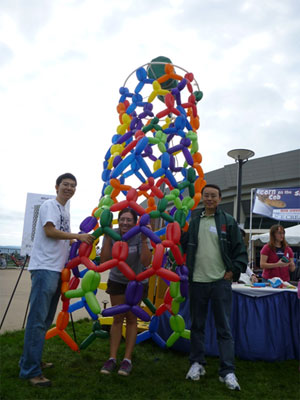
Graduate students who are supported by MRSEC research are part of a community that provides an array of career and personal development opportunities that are strategically designed to build skills and support future success. To help fullfill that mission, as well as advance the Center's outreach mission and responsibilities, grad members are expected to engage in Center-hosted activities.
Professional Development
Preparing graduate students and postdocs to obtain rewarding future employment is a Center priority. Penn State MRSEC Alumni have found success in industry, national labs, government agencies, academia, and more. Center-hosted programs regularly invite alunmi and career-focused representatives to inform, guide, and mentor current students about the job search process and potential opportunities. Further, professional skill building and leadership opportunities are intentionaly integrated into many facets of the education and outreach portfolio and management structure.
Outreach Teams
Graduate students who are supported by the MRSEC grant are expected to annually choose a non-research team within the Center that best matches their personal interests and/or professional skill-building goals. Participation lasts for a full calendar year. In doing so, graduate students contribute meaningfully to the delivery and achievement of the Center's outreach goals and satisfy an important grant requirement of the National Science Foundation. Each Team is led by a grad student Team Leader who focuses upon the team's education and outreach theme and the specific activities that support it. Teams are open to the broader Penn State's materials community, and frequently include affiliated non-MRSEC graduate students who want to make positive impacts outside of the research lab.
Graduate Student - Postdoc Advisory Committee
The input, needs, experiences and opinions of graduate students and postdoc members are a valued and essential component of the life of the Center. As a result, Center leadership meets 3-4x per year with student and postdoc representatives selected from each IRG and Outreach Team for open, two-way discussions. This personal, direct, two-way interaction provides an additional channel of effective communication across the organization that increases a true sense of MRSEC identity and community.
Graduate Research Experience and Transitioning to Grad School (GREaT GradS) Program
The GREaT GradS program aims to bridge the summer gap between undergraduate and graduate studies at Penn State through 6-weeks of professional development, graduate-level research, resource awareness, and mentoring. The shift to graduate school can be difficult for all students, and the program activities address a known need for unique support of underrepresented minority students during this critical transition period in their academic careers.
WHAT GRADUATE STUDENTS SAY ABOUT MRSEC OUTREACH
"MRSEC outreach has helped me come out of my shell as a communicator and leader. It allowed me to look at the broader impact of my research which I realized was invaluable for writing grants and proposals. Also, personally, it has made me better able to communicate with a wide variety of people and also developed my skills as a leader." - Sambeeta Das
"Outreach not only introduced STEM and what I work on to people unfamiliar with the field, it helped me learn how to present it to them so that they can fully understand it. That, and its fun." - Flory Wong
"The Penn State MRSEC has always put a heavy emphasis on its outreach program, and as a former active participant I greatly appreciate the personally rewarding experience. Not only did I get the opportunity to socialize with my peers at the university and those of all ages within the community, I have also practiced teaching sciences to a mixed audience, a skill immensely useful and critical for my current job: university faculty. And it was a lot of fun!" - Wei Wang
"Engagement in the education and outreach events of MRSEC has given me a unique opportunity to share the excitement of nanoscience with people beyond campus walls. As I work primarily with environmental application of carbon nanomaterials, this has also given me the chance to link my research to the need of real world and get feedback from the nonacademic community. Such discussions generate an enhanced sense of civic responsibility in me which is quite fulfilling. I got to think about technology transfer, economic issues and environmental concerns in a way that would be impossible in the confined laboratory workplace. Also, MRSEC outreach has given me an opportunity to develop "soft skills" such as interpersonal communication and leadership qualities. Being someone who wants to build a future career strongly focused in teaching, these are valuable skills to polish." - Archi Dasgupta
"Taking leadership roles within MRSEC outreach has given me valuable experience that I can draw from as I transition into a career in industry. MRSEC outreach is a great way to improve science communication skills by engaging community members of all ages. Arts Fest is my favorite event because it utilizes a hierarchical mentoring system where graduate, undergraduate and high school students learn from each other as they prepare to communicate science activities to young visitors." - Sarah Boehm
"MRSEC outreach has given me the opportunity to work in a group effectively and also shown me ways to explain scientific facts with fun models to kids and adults." - Arnab Sen Gupta

